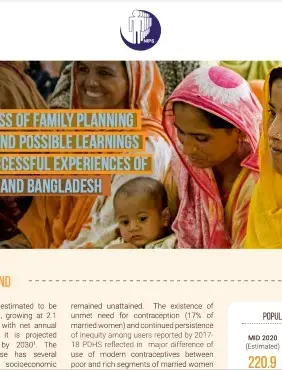Pakistan’s population is estimated to be 220.9 million (mid 2020), growing at 2.1 percent per annum and with net annual addition of 4.3 million, it is projected to touch 263 million by 20301 . The rapid population increase has several implications for the socioeconomic development of the country.
As one of the few pioneer countries, Pakistan visualized this situation in the 60s and took a policy decision to address population issue by introducing voluntary family planning services in the country. However, with five decades of investment in family planning program, only 25 per cent of women reported using modern contraception in 2017-18, the lowest amongst the Asian and neighboring Muslim countries


